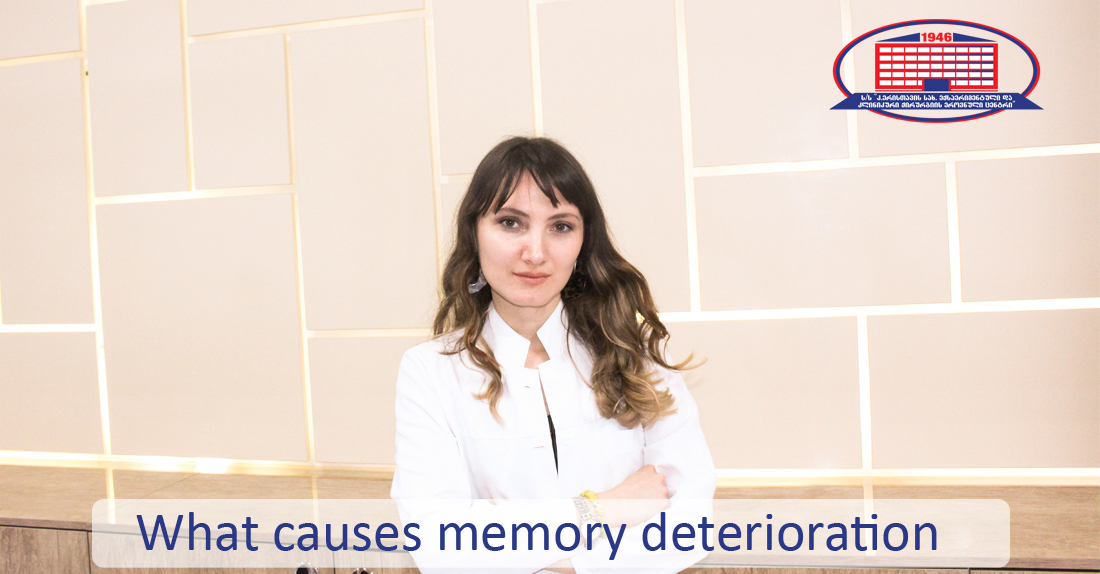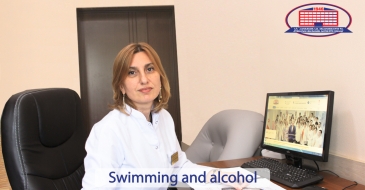
Memory is the ability to store and revive the information.
It belongs to biologic, as well as cognitive processes. There are visual, auditory and haptic (contact) memories. Because of the memory deterioration or loss of it, life significantly loses the meaning and the risk of developing dementia increases.
In a world medicine dementia is quite a pressing matter and statistically, according to the present data, only in the U.S more than 5 million people are diseased with Alzheimer. It is even more alarming that a new person develops the disease every 68 seconds.
Scientists fear that by 2050 the number of patients with this neurodegenerative disease will triple.
At the National Center of Surgery, you can utilize the promotion comprised of neurologist's consultation and neuropsychological testing.
The promotion is led by the National Center of Surgery's neurologist Tea Shubladze.
Ms. Shubladze discusses dementia.
– What is dementia?
– Dementia is a pathological condition developed after the organic brain damage, during which memory, oral communication, concentration, reasoning abilities, and other functions are disturbed.
As you know, certain parts of brain cells (neurons) experience necrosis (atrophic changes) alongside increasing age, which is a physiological process. Albeit, certain risk-factors provoke the brain damage, for example, long term stress, trauma, arterial hypertension, diabetes, vascular problems, excess intake of alcohol, etc. Alongside increasing age, it's necessary to pay more attention to memory problems.
– What can you tell us about the forms of dementia?
– Distinguished 4 forms of dementia are:
- Alzheimer type of dementia;
- Vascular dementia;
- Dementia developed during other diseases (Pick, Creutzfeldt-Jakob, Huntington and also in cases of specific diseases like epilepsy, hypercalcemia, cerebral lipidosis, etc);
- Unspecified dementia.
During dementia, short-term memory disorder mainly occurs on the first stage, while long-term memory is still intact.
During this time, the patient can freely tell important stories that took place 20-30 years ago but has troubles remembering where s/he kept an object a short time ago.
–What age do people complain about memory problems more frequently?
– Even though people over 45-50 years old are more frequently bothered by memory problems, it's noteworthy that patients under 45 also often address us. In this case, it's necessary to conduct clinical-laboratory examinations including one of thyroid gland functions, since in the case of the mentioned disorder, homocysteine synthesis disorder takes place as well and that aids the cognitive dysfunction.
– How to recognize the symptoms?
– Patients who address us, besides the memory disorder often have complaints regarding attention and concentration deterioration, disruption of thinking processes and learning skills.
Over time, in far-gone cases the motor skill loss (patient has troubles independently dressing, eating and so on.) and emotional impoverishment take place.
According to guidelines, the final diagnosis of dementia is possible only when the patient has been experiencing mentioned complains min. for 6 months.
– What can you tell us about the diagnostic method?
– Neuropsychological diagnostics with FAB;MMSE;MOCA tests are recognized worldwide, with the help of which the dementia diagnosis is confirmed.
The neurovisual examination is also important.
– How’s the treatment method?
– Of course, age is of great importance and therefore, treatment approaches differ based on age.
Prescription of antidementia drugs is very specific and requires appropriate indication.
According to the guideline, acetylcholinesterase inhibitor and neuroprotectors are the most effective when it comes to dementia treatment.
It should be mentioned that the risk of developing dementia is low in patients with high IQ. In the early stages of dementia (during a timely visit to the doctor) the patient's condition is manageable to some extent.
In case of no-treatment, the disease might progress quickly and because of that, it's less likely to have positive results. In those cases, the treatment is conducted to maintain current health conditions.
Unfortunately, there are cases wherein in case of no-treatment with the fast progression of the disease, patients don't remember the living address and even go missing without a trace.
Remember, timely memory management will prevent the threat of dementia development.
National Center of Surgery address: Tbilisi, Dighomi, Chachava N5.
You may contact National Center of Surgery’s call-center at577 119 119 or 2 02 25 25.
In case of any problematic issues, you may contact neurologist Tea Shubladze for consultation at 595 26 92 92.
Wish you health!








